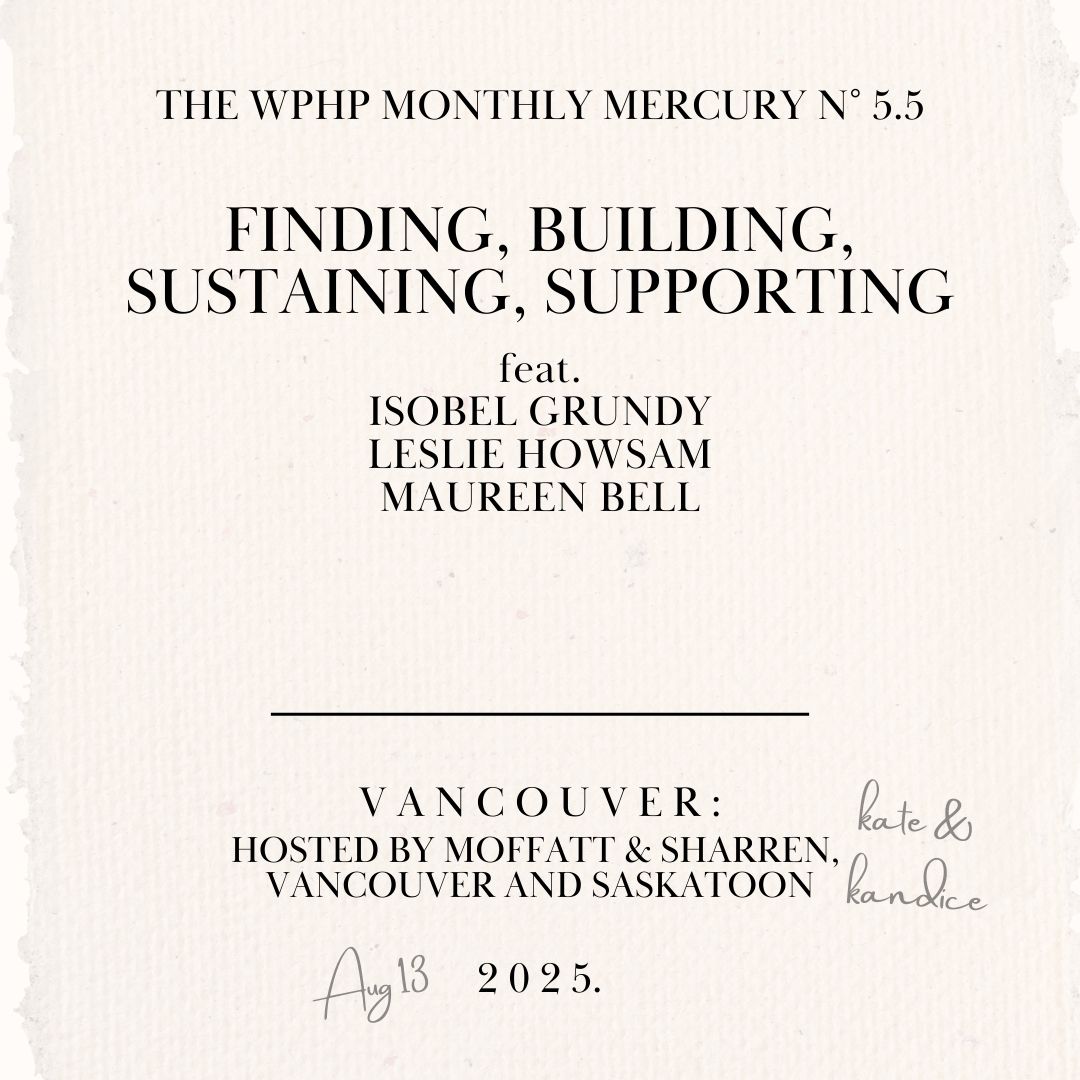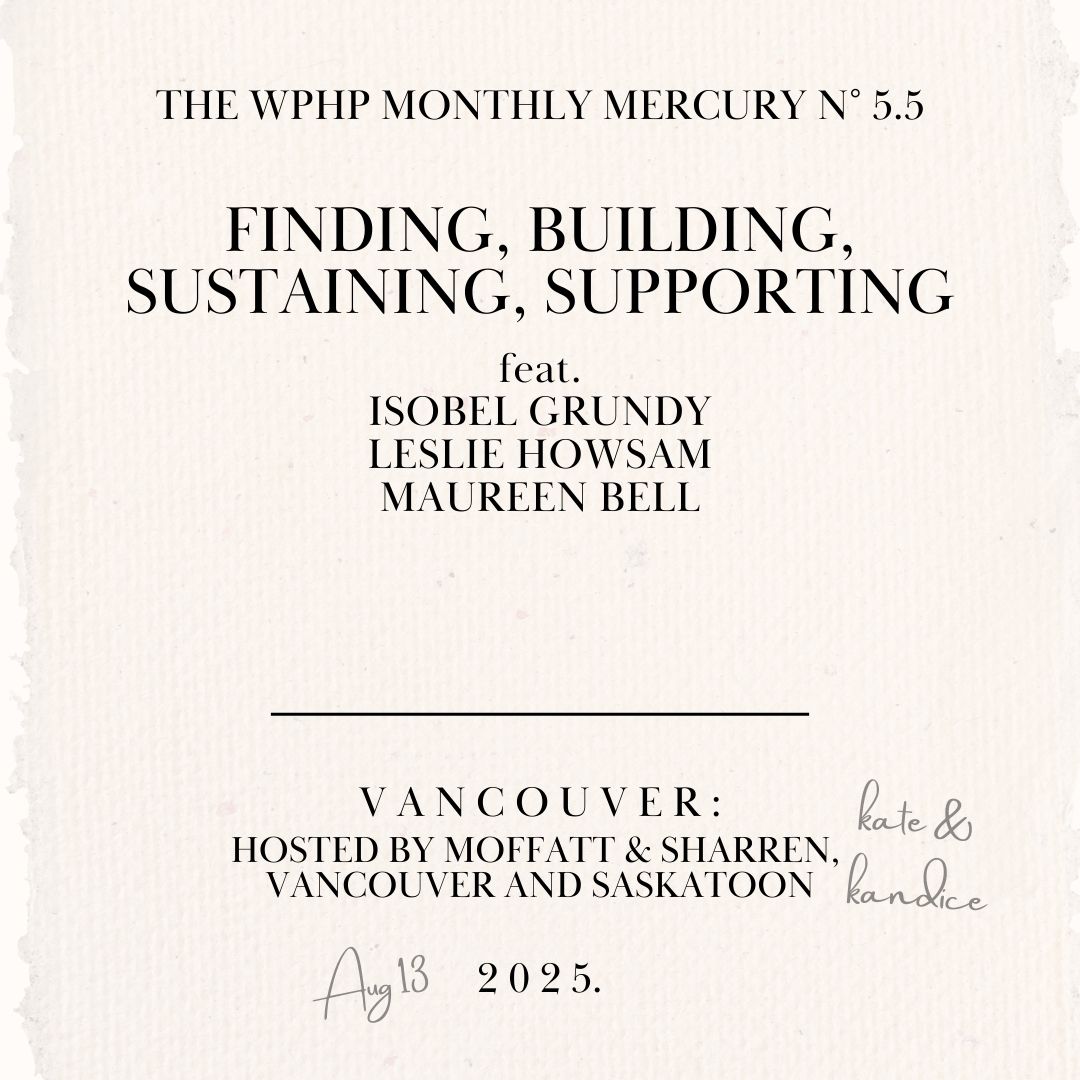
You can listen to Episode 5 of Season 5 of The WPHP Monthly Mercury, "Finding, Building, Sustaining, Supporting" on Apple, Spotify, and other podcast apps, available via Buzzsprout.
During ten years of working on the Women’s Print History Project, we have thought seriously and often about “women’s book history.” What is it, and how do we define it in relation to the WPHP? As women working on the history of women’s book history, what does it feel like, and what do we have to offer? What ground has women’s book history trodden — and where is it going? And how can we contribute to a sustainable future for the field?
As relatively new contributors to it, Kate and Kandice were thrilled to be joined—for the penultimate episode of The WPHP Monthly Mercury—by three scholars who have contributed to the field for decades and whose work has been invaluable to the WPHP, both practically and conceptually: Isobel Grundy, Leslie Howsam, and Maureen Bell. Isobel Grundy’s role as one of the founding editors of the Orlando project and her extensive work on women writers in the eighteenth and nineteenth centuries has helped to establish women’s authorship over the last few decades, and a broad and deep understanding of not only women’s written contributions, but the ways in which the field has developed as recovery work focused on women’s writing has taken place. Maureen Bell’s work on the British book trades and her role as the Director of the British Book Trade Index as it became a digital and publicly available project means she has a thorough understanding not only of the state of the field when it comes to the book trades in particular, but also knowledge of the history of one of the databases we use often on the WPHP—she shares why, for example, the BBTI does not include gender indicators (and how much they have bemoaned the decision since it was made). Leslie Howsam, as a historian, has both made use of the methodologies of book history in her research on nineteenth century publishers like the British and Foreign Bible Society, and provided commentary on the field itself, most recently in an article for SHARP News, “Revisiting My View: Feminist Book History from the 1990s to the 2020s.”
As one might suspect from these guests, the conversation is a thoughtful reflection on intergenerational collaboration and scholarship, the opportunities and limits of digital humanities, and where the field has been and where—we hope—it’s going. (Spoiler alert: we hope it’s going to a place rooted in continued, ongoing, and sustainable collaboration between past, present, and future researchers of women’s book history.)
Guests
Isobel Grundy is Professor Emeritus at the University of Alberta and Research Director of the Orlando Project. She holds her B.A. and D.Phil. from Oxford University (St Anne's College) and taught at Queen Mary College, London University (now Queen Mary London), and at Alberta as Henry Marshall Tory Professor.
She is one of three founding editors (with Patricia Clements and Susan Brown) of Orlando: Women's Writing in the British Isles from the Beginnings to the Present, a digital work of literary history, Cambridge University Press, 2006- (orlando.cambridge.org). She has published chiefly on Lady Mary Wortley Montagu, Eliza Fenwick, Samuel Johnson, and women’s writing of the long eighteenth century.
Leslie Howsam is a Fellow of the Royal Society of Canada and Emerita professor of history at the University of Windsor. She was part of the leadership of the Society for the History of Authorship, Reading, and Publishing from 2005 to 2021, serving as President 2009 to 2013. Her interest in women in book history (as authors and editors, printers and publishers, librarians and curators, and always as readers) began with the doctoral research that became Cheap Bibles: Nineteenth-Century Publishing and the British and Foreign Bible Society (Cambridge University Press, 1991). It continues as she investigates the connections between historical authorship and the book trade in Britain 1850-1950. Other publications include Old Books & New Histories: An Orientation to the Study of Book & Print Culture (University of Toronto Press, 2006) and Eliza Orme's Ambitions: Politics and the Law in Victorian London (Cambridge: Open Book Publishers, 2024).
Maureen Bell’s early research centred on seventeenth-century women as printers, booksellers and publishers, after which she worked on documentary evidence for the London trade (A chronology and calendar of documents relating to the London book trade, 1641-1700 with D.F. McKenzie). As Director of the British Book Trade Index she led its transformation into an online resource, publishing on the English provincial trade, its book-owners and readers. Co-editing A biographical dictionary of English women writers, 1580-1720 with G. Parfitt and S. Shepherd (Harvester, 1990) led to introducing a course in ‘Women’s writing of the seventeenth century’ at the University of Birmingham. A member of the Editorial Board of the Cambridge edition of The works of Aphra Behn, she is currently working on the Wast Register Book of the Stationers’ Register (this is its actual name, not a typo) and on the publishing of plays in the Restoration period.
Credits
Produced by: Kate Moffatt and Kandice Sharren
Music: Ignatius Sancho, “Sweetest Bard”, A Collection of New Songs (1769) from https://brycchancarey.com
Works Cited and Further Reading
Behn, Aphra, Claire Bowditch, and Elaine Hobby. Plays 1676–1678. Ed. Jennie Challinor. Cambridge University Press, forthcoming 2025, The Cambridge Edition of the Works of Aphra Behn, https://www.cambridge.org/core/series/cambridge-edition-of-the-works-of-aphra-behn/B57474E50D898E02D025CF3EC34229C2.
Behn, Aphra. Plays 1682-1696. Rachel Adcock, Kate Aughterson, Claire Bowditch, Elaine Hobby, Alan James Hogarth, Anita Pacheco, and Margarete Rubik, eds. Cambridge University Press, 2021, https://www.cambridge.org/core/series/cambridge-edition-of-the-works-of-aphra-behn/B57474E50D898E02D025CF3EC34229C2.
British Book Trade Index [currently offline, but available at https://bbti.grubstreetproject.net/ thanks to Allison Muri at the University of Saskatchewan, and at https://hcmc.uvic.ca/project/bbti/ thanks to Janelle Jenstad at the University of Victoria.
Orlando: Women’s Writing in the British Isles from the Beginnings to the Present. Susan Brown, Patricia Clements, and Isobel Grundy, founding project eds. https://orlando.cambridge.org
